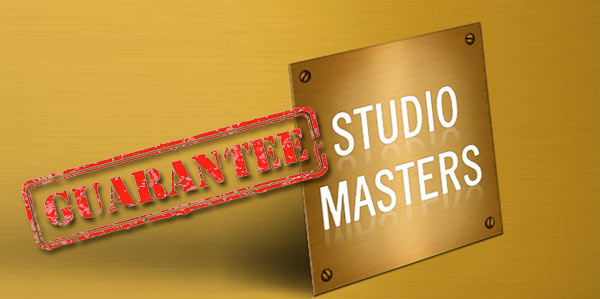Quality Control Guarantee
“The high-resolution music, that you purchase from us is guaranteed native (true original) 24bit HighResAudio Studio Master material. We have signed with all music labels, artists and artist-agencies contracts to assure exactly that. We do not accept nor offer up-sampled or converted material. Our quality-control checks and evaluates each album with a professional studio software! You will receive and buy only true original 24bit HighResAudio ‘Studio Master’ files from us.”
“The albums sold by Qobuz in ‘Qobuz Studio Master’ quality are supplied to us directly by the labels. They are not re-encoded from SACDs and as such we guarantee their pedigree. We refuse to accept suspect offerings simply to enlarge our offering.”
What good is a guarantee? Obviously, websites can state anything they want about the quality of the tracks offered on their respective sites. Here’s what I would say about the tracks that are available on iTrax.com, if I had a guarantee.
“The iTrax high-resolution audio website sells only real HD-Audio files. What is a Real HD-Audio recording? One that originated at the time of the session in real high-resolution…not analog tape, not direct to disc, and not standard resolution 44.1 kHz/16 bits PCM digital samples (those are standard resolution). Every track on the site was actually recorded using equipment running at 96 kHz/24-bits (there are some 88.2 kHz projects) or DSD 64 at 2.8224 MHz / 1-bit, which were converted to PCM at 96 kHz/24-bits.”
It sounds like everyone is on the same page, right? Well, not really. Is there any wiggle room in the statement from HighResAudio? In fact, there is. I have seen the licenses that the major labels offer to sites like HDtracks and others. I seriously thought about entering that business but the price was simply too high. The mastering engineers at the labels are simply doing transfers of the easiest available master. Sometimes that a digital master that has already been converted to digital and sometimes it’s a master that was intended for a vinyl LP release. Usually, it’s the most convenient master without any assurance that it’s the best master. I know this because I am friends with a lot of the mastering people that work doing this type of work. They’re not working with the right masters a lot of the time.
And just because the original master was transferred from an analog master doesn’t mean that there is 24-bits of dynamic range in the recording. As we’ve seen, recordings that eclipse 10-12 bits of dynamic range are very rare. So why would anyone that’s offering older, standard definition recording brag about them being bona fide 24-bit tracks?
It’s a feel good marketing plan. There is no benefit to music lovers or audiophiles to acquiring 24-bit recordings, if the masters can be completely captured using fewer bits. On the other hand, there is great benefit to having 24-bits when you’re recording a new master! You can push the signal level higher to take advantage of the additional dynamic range while the musicians are playing. The added “headroom” means that you can worry a little less about going into distortion. You capture excessive levels of dynamic range and then you can deliver less.
As for Qobuz, I got wise to their “it’s not our fault” mentality many months ago when I download a couple of sample files at 192 kHz…neither of which were native 192 kHz recordings. They were both, in fact, upconversions from a DSD master and an analog tape. So if the licensing company does the upconversion or monkeys around with the sound, then the guarantee still stands. A clever approach that takes Qobuz off the hook. They emailed me calling my analysis and revelations “malicious”. I would call their guarantee meaningless…it means nothing. In fact, most guarantees are.


Hi Dr. Waldrep,
I’m not disagreeing with your argument, but as a consumer of music that was mostly recorded in the 60s and 70s, what is the best way for me to play back those songs if not from SACDs, Hdtracks, etc? Is vinyl a better medium than even the best digital conversion of a master tape?
The best and only way to get the best playback of the classics from the 60s and 70s is to download them from HDtracks. Vinyl LPs are not as good as a good transfer at 96 kHz/24-bits. I would avoid SACDs…but that’s just me. If a particular album is only available as an SACD, then perhaps it’s worth getting.
Here is an example of a good guarantee!
http://youtu.be/mEB7WbTTlu4
Thanks for the flashback moment…Chris Farley was always fabulous!
Hey Mark,
I enjoy the blog and appreciate your cutting through a lot of the crap associated with file based music delivery… Could you review some of the current popular dacs on the market in addition to the Benchmark 2? I’m thinking the Chord Hugo from England, Eximus DP1 from S. Korea, and the least expensive, entry level unit from Lampizator in Poland… how well do they resolve your favourite files? It would be great to have an audio engineer’s perspective!
I’ll have to see if I can get my hands on some additional DACs to review. Stay tuned.
Best guarantee in the business at:
http://www.eclassical.com/
If you don’t like the track for any reason, they refund your money. On occasion, I have asked for a refund, and got it within a day.
Good to hear…I do my best to keep my customers happy. I’ve set up FTP site and spent lots of time on the phone helping people with their systems.